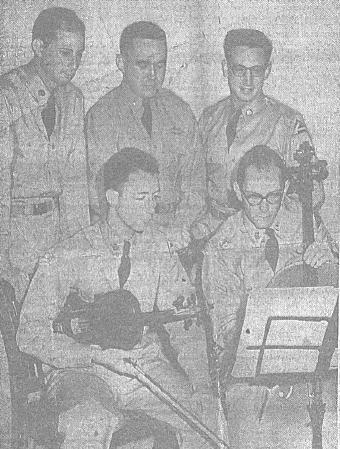STUTTGART, Germany,
Oct. 11 - With bassoons, violins
and oboes for weapons, with three
buses for transportation and most of
Western Europe as their battlefield,
U.S. Army soldiers are winning an
impressive victory in the cold war.
The Seventh Army
Symphony Orchestra - four of whose
members are from Brooklyn - is one of
the most unusual musical organizations
in the world.
Composed entirely of
draftees - the average age is 23 - the
orchestra was created by the army in 1952
to bring fine music to troops and civilians
in Europe. It is the only known military
orchestra whose repertoire consists
exclusively of classical music and its
musicians all have a solid musical
background.
Before entering the Army,
they were either in their last year of study
or already performing as professionals for
such distinguished orchestras as the Boston
Pops, the New Orleans Philharmonic and the
Minneapolis Symphony.
The orchestra's escort
officer and only non-musician in the travelling
group is also a Brooklynite, 1st Lt. Frank J.
Maguire of 155 Garfield Pl. As escort officer,
it's his job to see that the men are housed,
fed and that they arrive at the concert hall on
schedule.
"Our biggest headache," he says,
"is rotation. All our men are draftees and
it's quite a problem to find replacements and
then get them to learn the scores for the next
performance.
|
"Our turnover is tremendous.
The orchestra seldom has a man more than a year
and a half. This is one situation no other
symphony orchestra faces."
Despite this problem, the
Symphony has more than held its own on a
continent where good music is commonplace.
It plays some 170 concerts per year throughout
Germany and in major European cities.
Bookings are arranged through
the Symphony's office in nearby Vaihingen where
the musicians live. They occupy the attic floor
of an old German Army caserne where they also
practice in a specially built rehearsal hall.
Most Performances are free and
sponsored by a local Army unit or the U. S. State
Department to improve community relations. Where
there is a charge the proceeds go to a local charity
or to support a German orphanage sponsored by members
of the symphony. There is seldom an empty seat in
the house.
Brooklyn has the highest
representation of any U.S. community among the musicians.
Borough members of the orchestra
include PFC Joseph Paladino of 9009 Bay View Pl.
'cellist; Pvt. Robert Sharon 2134 E. 36th St., string
viola; and Pvt. Jules M. Hirsh of 2336 62nd St.,
string bass. Pvt. Myron Rosenblum, who plays the
string viola, lives in the Bronx, but considers
Brooklyn his second home because he attended Brooklyn
Technical HS.
|
The Symphony rehearses for several
months a year then takes to the road in three Army
buses and a truck which holds the baggage and instruments.
On tour, the musicians are house at Army
posts or in hotels. Because the absence of one man could
lower seriously the performing standard of a concert,
no leaves are granted during rehearsals or while on tour.
The entire orchestra takes a month's leave in the summer.
Like most Army units, however, the men
are constantly reminded that they are soldiers first.
Each man is equipped with a carbine, which however,
remains locked in an arms room with a full-time armor
man to clean the weapons.
The musicians train for four hours each
week; when they travel they carry their equipment in a
duffel bag, and they are subject to transfers to the
infantry if they misbehave, which is rare. According to
Lt. Maguire, there has never been an AWOL.
As for audience reaction, members of
the orchestra say it has been outstanding. They say the
best illustration of this was a German official's statement
after a recent performance: "Everyone knows Americans can
produce cars, but this . . ." then he gestured toward the
orchestra, "is hard to believe."
* * * * *
|
